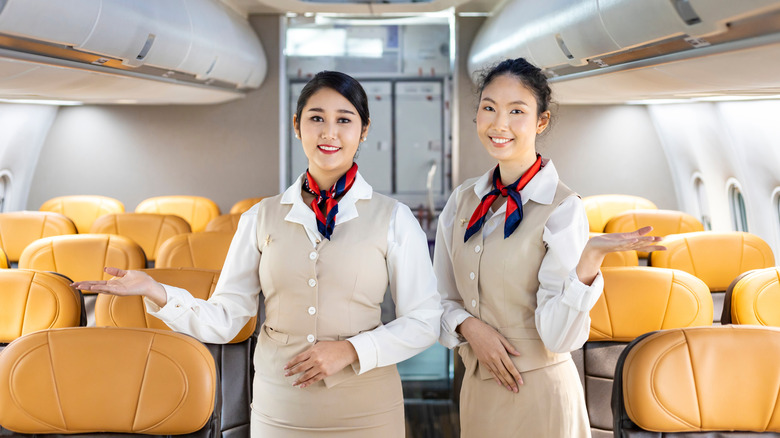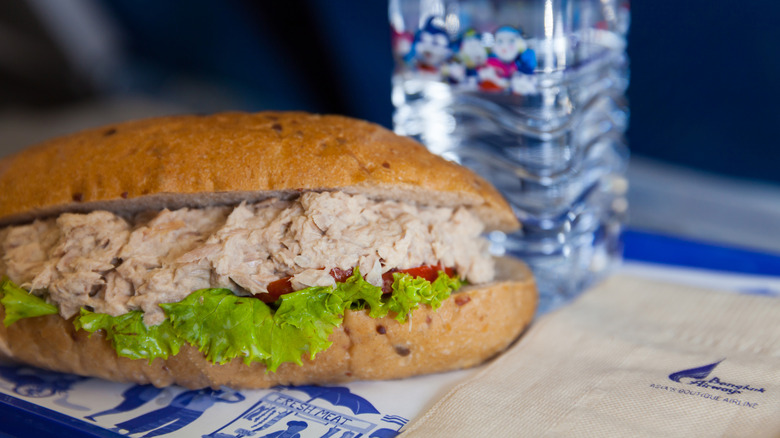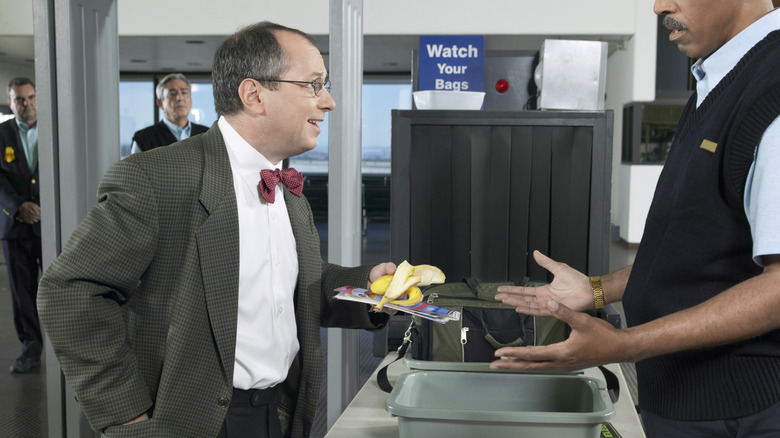The Worst Food Items To Bring On A Plane, According To Flight Attendants
When you board a plane, you enter into an unspoken agreement with your fellow travelers about proper etiquette — and this includes food choices. You're already packed in like sardines. If somebody opens up an actual can of the fish, they'd be committing a major flight faux pas for obvious reasons. Fish might sound like an outlandish thing to bring on a plane, but you'd be surprised what people try to get away with. Bringing specific food on a flight is just one of many things flight attendants hate.
So what are they begging us to stop bringing aboard? According to flight attendants, the worst food items you could bring on a plane have a strong odor or create a complete mess. These food items test flight attendants' patience — after all, they are the ones who handle passenger complaints about pungent foods and clean up any spills that occur mid-flight.
Smelly and messy foods seem like obvious no-nos on a flight, but we're not just talking about sardines and spaghetti sauce. Some seemingly innocent foods can also cause problems in a confined cabin space. Meals that might be fine at home can be surprisingly stinky at 35,000 feet and with no open windows. Similarly, what appear to be convenient travel snacks could end up scattered across the floor and wedged between seats. So before packing for your next flight, consider your fellow passengers. And if you need a friendly reminder, read on to learn exactly which foods flight attendants — and the TSA — encourage you to leave behind.
What constitutes smelly and messy foods (and how they affect flight attendants)
In an interview with Delish, an anonymous American Airlines flight attendant listed the foods that wrinkled her nose. Two obvious examples are eggs and fish. Hard-boiled eggs and tuna packets are protein-filled snacks you might be tempted to take on that next flight. However, flight attendants would beg you not to. Eggs immediately expel a sulfur-like odor, and tuna's intense fishy smell lingers.
Sauteed onions and fried fast food are also noxious in a confined space. The flight attendant told Delish that the stench of fast food "sticks to your clothes." Flight attendants don't have the luxury of washing their uniforms after every flight — and Eau de French Fry isn't exactly their preferred perfume. The attendant complained about meaty packaged foods like jerky and barbecue corn nuts — though their flights tend to serve barbecue corn nuts to first-class passengers, they said, "When you open the bag, it smells like something is burning on the plane."
Beyond odor issues, airplane snacks can also create a mess. Obvious culprits include poorly packaged foods with sauces, like meatball subs or tacos. However, they also include finger foods you'd eat by the handful like popcorn or Goldfish. These dry foods seem like a good choice at first, but if you don't have a spill-proof bag or hit turbulence, those Goldfish could go flying. The American Airlines flight attendant said that kids' snacks in particular annoy her. She said she wishes passengers would stop bringing "anything that could be stepped on and make a huge mess because [the] majority of parents will not clean it up and it gets in the carpet."
Can the TSA confiscate food items?
It's perfectly legal to bring food on an airplane. However, food still falls under the Transport and Security Association's 3-1-1 liquid rule: If your snacks are in liquid or gel form, they must be in 3.4-ounce containers and fit into a quart-sized bag. The exception to this rule is medically necessary liquid, which includes baby and toddler foods like formula and breast milk, and any ice packs to keep them cool.
Special rules also apply to alcohol. The TSA states that you're allowed to bring up to 3.4 ounces of alcohol in your carry-on, which is just over two shots of liquor. However, anything over 140 proof is banned both onboard and in checked luggage. It's important to note that according to the Federal Aviation Administration, it is illegal to consume any alcoholic beverages on a plane that is not served by a flight attendant. After all, alcohol can induce unpredictable or abrasive behavior, and it's the flight attendants' duty to keep passengers safe.
At the end of the day, the TSA has the final say over what is allowed through the security checkpoint. Typically, these officers default to the rules — and the TSA allows most solid food on planes. To play it safe, we recommend packing food in a plastic bag, so you can easily zip through TSA. Make sure that if you're bringing items like fruit, vegetables, cured meats, or cheese from abroad in a carry-on snack bag, eat them before you land — otherwise, the TSA will make your life miserable. And for the sake of your flight attendants and fellow passengers, exercise some common courtesy and avoid stinky, messy foods on flights.


